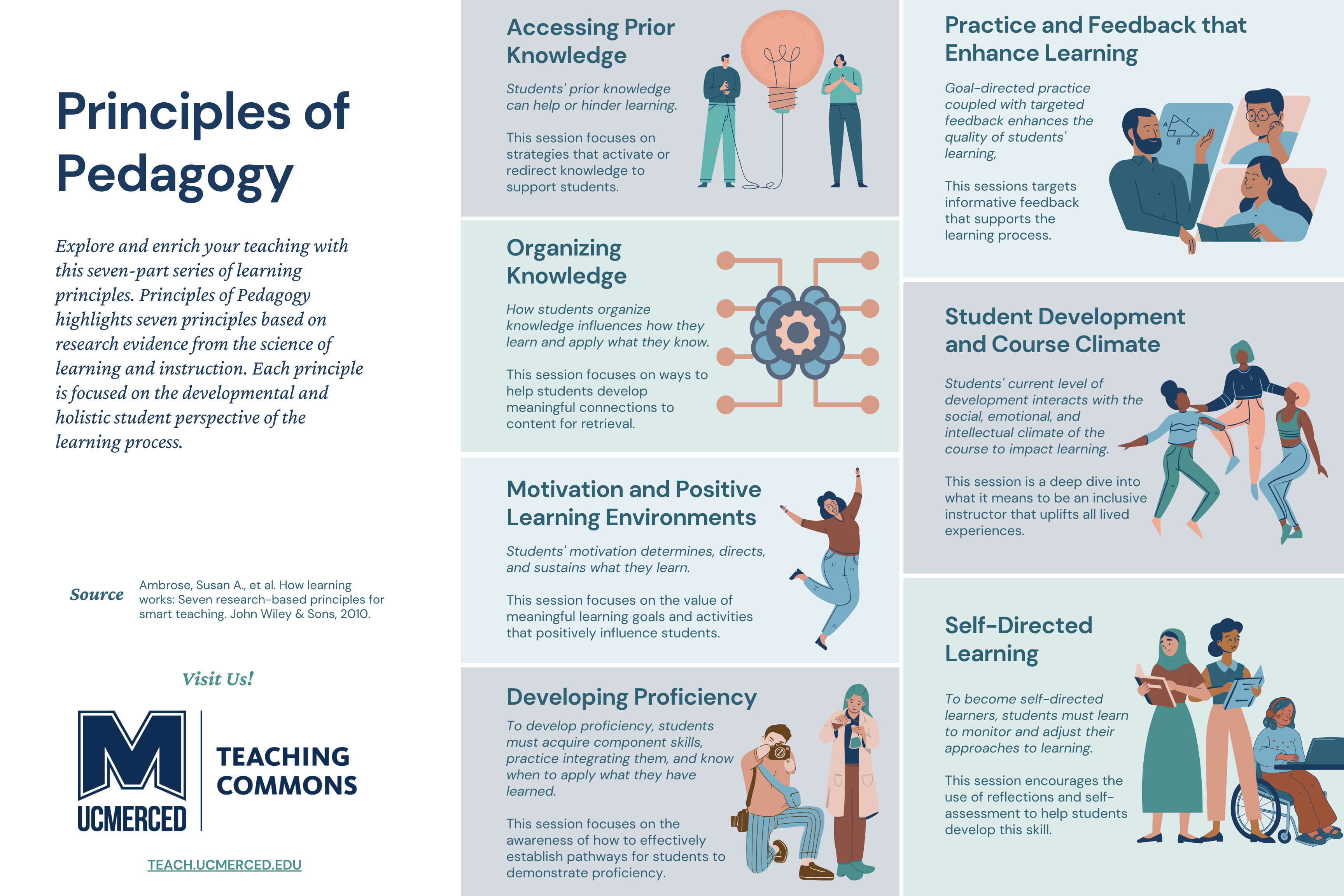Teaching Commons offers a variety of ways for you to enhance your skills as a communicator, educator, and learner. The following are professional development programs, courses, and opportunities to support your needs! Looking for help writing a teaching statement? Check out this great guide for writing a teaching statement, get writing support from the University Writing Center, and book a consultation with our team to review your drafts. For more information, or to discuss options, please schedule a consultation with our team!
Teaching Commons Pedagogy Program
-
Principles of Pedagogy (Fall)
-
Advanced Pedagogy (Spring)
Faculty-Led Pedagogy Coursework
Principles of Pedagogy
Learning Outcomes
-
Explore seven principles that promote student learning and success.
-
Discuss new ideas in a spirit of open interaction, reflection, and self-improvement.
-
Apply evidenced-based strategies to real-world discipline-specific instructional scenarios.
-
Develop a personalized teaching toolkit of evidence-based strategies to apply in your discipline.
How Do I Sign Up?
- Principles of Pedagogy is also offered in person every fall semester.
-
CHECK HERE IN LATE SUMMER FOR REGISTRATION
-
Advanced Pedagogy
Interested in a teaching career? Advanced Pedagogy is for you! Graduate students or postdocs who have completed "Principles of Pedagogy" or a department-offered pedagogy course are eligible to register for "Advanced Pedagogy". This series is designed to prepare future instructors for their careers in teaching, covering lesson design, student-centered syllabi, teaching technologies, and more! In addition to the core content, each participant will customize their experience to meet their needs! Browse our available workshops to choose the pathway that is right for you!
Click here to see a detailed overview of past Advanced Pedagogy programming.
Learning Outcomes
- Establish a specific personal goal based on your teaching development interest.
- Demonstrate alignment across learning outcomes, assessments, and learning experiences within a given lesson.
- Identify advanced pedagogical and/or academic technology strategies to use in teaching.
- Reflect on the impact of identified strategies on student learning outcomes.
- Draft a lesson plan, syllabus, and teaching statement.
- Present professional growth and development in reflections and a final presentation.
How Do I Sign Up?
- Advanced Pedagogy is offered in person every spring semester.
-
SPRING 2024 IS FULL! CHECK BACK TO REGISTER IN SPRING 2025.
-
-
If you feel confident navigating a self-paced online program, we also offer Advanced Pedagogy online. Please connect with us to register anytime!
![]()
Faculty-Led Pedagogy Coursework:
Pedagogy: IH 203 with Dr. Eileen Camfield
Designed to guide graduate students through a “teaching as research” paradigm, culminating in a teaching philosophy statement for humanities instruction. In addition, it is a practice and assessment course that provides graduate students with an applied experience with “teaching as research,” resulting in a set of teaching plans for humanities instruction.
Teaching and Learning: MATH 201 with Dr. Yue Lei
Students will be introduced to 'scientific teaching' - an approach to teaching science that uses many of the same skills applied in research. Topics will include how people learn, active learning, designing, organizing, and facilitating teachable units, classroom management, diversity in the classroom, and assessment design.
Teaching in Psychology: PSY 290 with Dr. Jason Isbell
Under faculty supervision, a group of students meets each week for a semester in a student-led study group to pursue a specific topic of their choice that is not covered in other department courses.
Teaching and Learning: QSB 201
Introduces 'scientific teaching' - an approach to teaching science that uses many of the same skills applied in research. Topics include how people learn, active learning, designing, organizing, and facilitating teachable units, classroom management, diversity in the classroom, and assessment design. This class is interdisciplinary and can be taken by graduate students in any program.
University Teaching: QSB 399
Centered on a student’s classroom experiences as a Teaching Assistant in an undergraduate Biological Sciences course. Provides a faculty-directed opportunity to implement theories and methods learned in the course Teaching and Learning in the Sciences (QSB 201 or MATH 201). Involves video-taping of teaching, peer review, and weekly meetings with faculty to receive feedback on their teaching practices. Course participants must have at least a 25% teaching assistant position during the same semester. Prerequisites: QSB 201 or MATH 201
QSB 399: Course Learning Outcomes
By the end of this course, you should be able to:
- Implement and refine evidence-based teaching strategies into your course curriculum.
- Develop a question about what is happening in your teaching context, collect evidence to gain insights, and share your results with others through poster presentations.
- Review your teaching through classroom observation, survey, and/or interview data and reflect on expanding current beliefs, knowledge, and practices of teaching.
- Transfer applied teaching skills into other scientific professional activities, such as research posters, presentations, lab meetings, etc.





